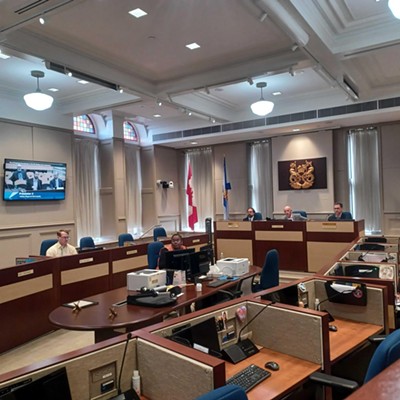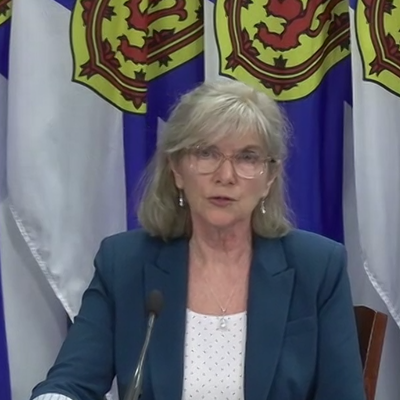City Hall meetings are a little different these days since new CAO Cathie O’Toole took over. Her predecessor, Jaques Dubé, was a very public CAO, frequently speaking in HRM’s council meetings to explain the processes, often right before or right after a member of city staff had just given the same explanation in slightly different words.
The new CAO, O’Toole, speaks a lot less. And when she does, it’s only to add information or to clarify things. This is a subtle change in the style of professionalism and leadership modelled by the city’s top bureaucrat, and the effects of these changes (if any) are slight enough that they will take years to materialize into tangible outcomes. Even the most ardent of cynics are hard-pressed to refute that Halifax seems to be in better hands with this CAO. And we learned this on Tuesday, thanks to a very incomplete municipal plan for playing fields.
With that, let’s delve into Tuesday’s business!
Things that passed
Council got an update on a municipal playing field strategy. City staff poked around and discovered that we have enough fields for everything we want to do right now, unless you play cricket. There is only one cricket field in the HRM, a temporary one set up on the Common, and it has a long waitlist. This playing field strategy was largely panned by council, which sucks, but is good, kind of. More on that below.
In soccer, a field is a pitch. In cricket, the field is a big oval, and the middle bit with the three sticks is called the pitch. Those sticks are called wickets, and wicket can be used as a verb to describe the cricket equivalent of striking a guy out. Not to be too confusing, but wicket is also slang for cricket field, and cricket games (AKA tests) can last days. This may help explain why the wait time for the wicket on the Common is so long.
On Aug. 19, there will be a tribute ride along the Highway of Heroes, and its organizer has requested a flyby. If anyone sees that helicopter in mid-August and remembers this little tidbit, that’d be quite the golden duck.
A golden duck is cricket slang for getting someone out on the first pitch. This is apparently quite rare and requires a lot of skill and some luck to break for the pitcher.
Councillor David Hendsbee’s bylaw amendments to clean up advertising on provincial highways passed today. For those who don’t live in the rural parts of the HRM, the sides of the road are rotten with advertising signs. It’s like election season for local businesses all the time on provincial highways, but it really takes away from the natural rugged beauty of the Eastern Shore. Companies will still be able to put out their signs, but the sign use will be regulated, and companies will have to pay a fee to the city to put up their signs.
The city will now charge administrative fees for property tax documents. Reprinting a property tax bill and statements, adding power of attorney to a property (mostly commercial/multi-unit), and moving money between property tax accounts or taking it out will all come with a fee of $15. City staff told council at this legislation’s first reading that, broadly speaking, If the city screws up and that’s why you need an administrative service, this new fee will not be charged.
The city is moving ahead with paving Silverside Drive, Topsail Court, Trinity Lane and Rosely Road. The residents of those streets are on the hook for 33% of the cost of the improvements to their streets in a cost-sharing agreement.
The landlord registry got approved today. These bylaw changes mean that all residential properties must register with the city by April 1, 2024. And all registered properties must adhere to basic habitability standards. The Independent Property Owners Association of Nova Scotia has apparently been lobbying against these changes, prompting councillor Waye Mason to write an open letter. The letter says (abridged) regulations are needed to keep people safe, and this legislation is coming to do that.
The city’s non-disclosure agreement legislation is being tweaked. Council is putting tighter controls on how NDAs can be used, further restricting and limiting the city’s use of NDAs to their specific professional purposes for existing. The staff report notes, however, that this policy does not apply to employees in their personal capacity, and that NDA might impact their work and employment in the HRM.
The Pan African flag will stay on two crosswalks on Highway 7, at Cherry Brook and Maclaughlin roads.
If your private street has lights with burnt-out bulbs, the city will continue not to replace the bulbs (or maintain the poles) until it owns the street. This process is a bit convoluted, so if this applies to you, call your councillor and/or 311, because a lot of these will be dealt with on a case-by-case basis.
The African Nova Scotian Road to Economic Prosperity got funding today. The city will spend $365,000 over three years to start this plan, and the built-in accountability mechanisms mean there should be regular updates on the progress of its implementation.
The city is raising the interest rate on overdue accounts back up to 15%. The city lowered the rates during the pandemic and is now bringing them back up to pre-pandemic levels. Council is doing this because if punitive fines are too low, people don’t pay the fines. For example, illegal parking has very bad enforcement, and low fines mean people can park illegally for years downtown and only eat about $115 in fines. Hypothetically.
Speaking of which, councillor Tim Outhit put forward a notice of motion to penalize illegal parkers for being repeat offenders. Without stronger enforcement, this is a relatively toothless policy. Since 10 years of parking illegally can lead to a grand total of three parking tickets—hypothetically—a higher fine for repeat offenders wouldn’t be that much of a deterrent. This is likely why the HRM has a tender out for better parking enforcement technology. Halifax is regulating car use with the stated goal of these regulations being to stop people from driving. Forward-thinking businesses that rely, or believe they rely on parking need to start adapting their business plan. This city council believes (correctly) that climate change is happening, and is writing parking policies in service of having a habitable planet in the future. Making driving more expensive is the new regulatory environment in this city moving forward—update business plans accordingly.
The long-awaited development at 5189 South Street will wait a little longer. The developers, Galaxy Property Limited, are applying for density bonusing. They give the city more money, and they’re allowed to build more units than the zoning allows for if some of them meet municipal affordability standards. This, in theory, gives the city coffers more money and gives the city more affordable housing.
6032 Charles Street and 2096 Creighton Street will both get public hearings on becoming heritage buildings at some point in the future.
Notable Debates
The municipal playing field strategy was an interesting debate. The normal, boring part of the debate is that almost every single councillor had issues with the city’s proposed strategy. Essentially, the city has been doing master plans for a while, and the process normally goes like this: Council would identify a priority, staff would put together a plan and present it to council. Council would then bring up hyperlocal (read, tactical) issues with the strategic plan, and send the plan away for more information. And then the plans disappear into the endless void created by elected officials making requests of staff that are unrealistic to answer.
And to be clear on why the requests are unrealistic: A strategic plan is one that has a goal and a decision-making framework centred on that goal. That framework needs to be adaptable, because, as Mike Tyson once said, “Everyone has a plan until they get punched in the mouth.” Strategic plans need to be able to adapt to punches in the mouth. Tactical plans are smaller local plans done in service of the larger strategic plan. If the strategic planning process is bogged down in the tactical, it will never be implemented. Historically, the deference to the regional concerns of councillors has been the main source of delay for City Hall realizing its long-term planning ambitions.
Take, for example, the issue raised by Hendsbee about a ball field in his district at Lawrencetown Community Centre. He told council the landowner next to the ballfield wants to give the city eight acres, which the city could then use to put in a pump track in, a skate park and all sorts of cool stuff. The Lawrencetown Community Centre could become a genuine community centre at the hub of an active community. However, the city has no field plan, so getting and developing those eight acres of land has not happened.
Typically after every councillor shoots down the strategic plan with tactical issues, the CAO would offer to take it away and try to appease each councillor’s minor regional complaints before putting the plan in place. This CAO instead told councillors not to let perfect be the enemy of good. Having an imperfect plan in place means there’s a plan in place to follow, and things can actually start happening around the city based on that plan. If things aren’t working, it’s easy to then change the plan. O’Toole told councillors that their regional complaints should help shape the implementation of their strategic plans, not prevent strategic plans from being implemented in the first place.
The ironic part of this, for the issues Hendsbee raised specifically, is that the park plan will likely be implemented sooner and better than the Integrated Mobility Plan. This, in turn, means the Lawrencetown Community Centre will get a whole bunch of cool stuff for kids to skateboard and bike ride on, but they’ll have no way to safely skateboard or bike ride there.
In the interest of full disclosure, that example was chosen due to geographic proximity. It’s an issue where the nuance of the geography is familiar, but each one of the issues brought up by local councillors is similarly nuanced. Nuanced issues don’t fit well into a strategic plan because those aren’t strategic issues, which paralyzes the strategic planning process. The very good news is that this new CAO seems to understand how to do genuine, strategic long-term thinking and is implementing that in Halifax’s strategic planning.
In other news, council decided to regulate rental units. Councillor Trish Purdy was worried this policy was unfairly targeting good landlords because of a “few bad apples.” Apples are stored in containers in cool, dark places and can stay good for a really long time in ideal conditions without any artificial preservatives. The only thing that risks their long-term well-being is a rotten apple in the bunch. Rotten apples produce a gas called ethylene that will make other apples start ripening and prematurely rot. It is important when storing apples to aggressively and proactively search out and remove the bad apples, otherwise all of the apples in your bunch will be ruined.
Halifax’s landlord registration is the exact correct way to deal with bad apples. It is a proactive measure that will capture all landlords by April 1, 2024. There will be no more bad apples if this legislation is successful. There will be a list of city-certified good apples, along with bad-apple landlords who don’t meet some pretty basic standards of habitability. These standards of habitability are ones landlords are already legally required to meet due to those standards also being the national building codes, but until the bylaw comes into effect, there is no enforcement of those building codes.
















